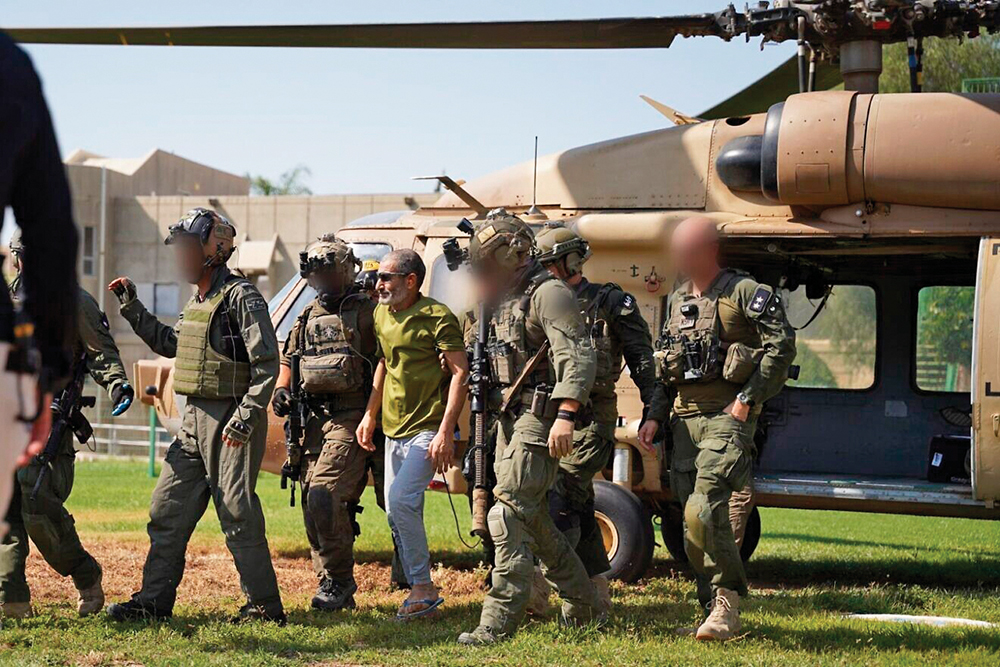Qaid Farhan Alkadi’s longtime friend called Hamas “devils.”

Qaid Farhan Alkadi, who was rescued from Gaza by Israeli forces on Tuesday, August 27 after 326 days in Hamas captivity, was released from Beersheva’s Soroka Medical Center on Wednesday afternoon.
Meanwhile, relatives of the 52-year-old Muslim Israeli and father of 11 from the Bedouin city of Rahat in the Negev Desert have begun to share details regarding the brutal conditions he experienced since his abduction on Oct. 7.
“He spoke about the darkness, not being able to see. But, thank God, he’s back with us, alive—it made us all rejoice,” Alkadi’s cousin Fayez al-Sana told the New York Times after visiting him in the hospital.
Ata Abu Medigm, the former mayor of Rahat, told Ynet that Alkadi was held in near total darkness for months: “He told about a very brutal captivity, he hardly saw the sun for eight months. He would check if his eyes were functioning. He said that one of the abductees was with him for two months and died next to him.”
Dr. Mazen Abu Siam, a longtime friend and veterinarian, in a conversation with the Times called Hamas “devils” and said that Alkadi’s family had suffered from terrible anxiety for 10 months.
He had more harsh words for Hamas, listing the cases in which civilians were murdered on Oct. 7, including over 300 people at the Nova Music Festival: “They attacked everyone, even people dancing under the trees,” he said.
“I got permission to visit [Alkadi] inside [the hospital]; I went in for two or three minutes. He’s fine, he’s healthy, he looks fine. A little pale. Thin compared to Oct. 7,” he said, according to Ynet. “Hope he will be released to the family tomorrow. He mentioned that he was in the tunnel for a long time, cut off from the outside world, was not connected to the Israeli media and did not know what was happening around him. I hope that all the families who have abductees in Gaza will feel what we felt on this day.”
Alkadi’s brother Juma’a told CNN that “he was dead and is now brought back to life,” and that “it was all tears. Tears of joy. What matters is that we saw him.”
Juma’a said that Alkadi was shot in the leg during the Hamas-led attack of Oct. 7, and the wound was poorly treated during captivity. Alkadi had been operated on without anesthesia, “as one does with animals.”
Ynet quoted his relatives as saying after visiting him in the hospital that Alkadi had “lost a lot of weight,” having eaten “mainly bread” in captivity, and “not every day.”
However, they continued, “he is on his feet and talking about the matter. He was constantly thinking about the family and never stopped believing that he [would get] out of there. We don’t know how he survived, but he survived and he’s alive, and that’s the most important thing.”
Alkadi is the first Israeli Arab and eighth Israeli overall to be rescued alive from Gaza by Israeli forces. He is also the first captive to be reclaimed from the terror group’s vast tunnel network beneath Gaza.
Israeli officials told CNN and the Times that special forces, acting on intelligence, were combing tunnels when they found Alkadi, who was alone in a room roughly 25 yards underground, without Hamas guards. The team, led by Shayetet 13, the Israeli equivalent to the U.S. Navy SEALs, initially thought he was a Hamas operative. He appeared weak and malnourished and was incapable of climbing out of the tunnel on his own, according to the report.
According to Channel 12, the team, which included members of Yahalom, a special unit of the IDF’s Combat Engineering Corps, entered the tunnel after determining that Alkadi was alone. They called to him and he answered: “It’s me, Farhan, don’t shoot.”
The operation was complicated because he was in a complex consisting of several tunnels, in a side room, and forces feared that it could be a Hamas trap.
“The assessment in Israel is that, at least in some cases, Hamas lost contact with the abductees and … is now trying to understand what happened to them,” Channel 12 reported.
Alkadi’s rescue leaves the number of hostages still held by Hamas in Gaza at 108, including 104 of the 251 hostages taken on Oct. 7—34 of whom are deceased, according to the military.
At least 17 Bedouins died in the Oct. 7 attacks.
Hatam Kadi, another brother, told Ynet that the message Alkadi wants to convey is that “we must remember that there are other people inside,” and that being a native Arabic speaker did not help him at all: “He was treated as an Israeli.”










